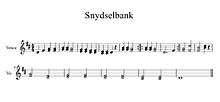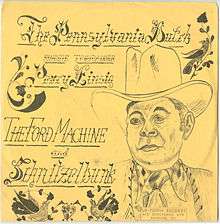Schnitzelbank
The "Schnitzelbank" is a simple song, popular most with German Americans.
| "Schnitzelbank" | |
|---|---|
.jpg) | |
| Nursery rhyme | |
| Published | By 1900 in U.S. |
| Songwriter(s) | Unknown |

Etymology
Schnitzelbank literally means "scrap bench" or "chip bench" (from Schnitzel "scraps / clips / cuttings (from carving)" or the colloquial verb schnitzeln "to make scraps" or "to carve" and Bank "bench"); like the Bank, it is feminine and takes the article "die". It is a woodworking tool used in Germany prior to the industrial revolution. It was in regular use in colonial New England, and in the Appalachian region until early in the 20th century; it is still in use by specialist artisans today. In America it is known as a shaving horse. It uses the mechanical advantage of a foot-operated lever to securely clamp the object to be carved. The shaving horse is used in combination with the drawknife or spokeshave to cut down green or seasoned wood, to accomplish jobs such as handling an ax; creating wooden rakes, hay forks, walking sticks, etc. The shaving horse was used by various trades, from farmer to basketmaker and wheelwright.
A Schnitzelbank is also a short rhyming verse or song with humorous content, often but not always sung with instrumental accompaniment. Each verse in a Schnitzelbank introduces a topic and ends with a comedic twist. This meaning of the word is mainly used in Switzerland and southwestern Germany; it is masculine and takes the article "der". It is a main element of the Fasnacht celebrations in the city of Basel, where it is also written Schnitzelbangg. Schnitzelbänke (pl.) are also sung at weddings and other festivities by the Schnitzelbänkler, a single person or small group. Often the Schnitzelbänkler will display posters called Helgen during some verses that depict the topic but do not give away the joke.[1]
Song
A German-language ditty for children "The Schnitzelbank Song" is popular among German Americans with an interest in learning or teaching German to their offspring. It is often sung by adults for entertainment and nostalgia. Versions were published in the United States at least as early as 1900. [2]
In 1880, Brahms used this song in his Academic Festival Overture.
Groucho Marx was performing it on Vaudeville by 1910. [3]
In the 1932 film Downstairs, set on a baronial estate in Austria, nefarious chauffeur Karl (John Gilbert) sings the song with butler Albert ( Paul Lukas ) and Albert’s beautiful new young wife, Anna (Virginia Bruce), at dinner, trying to ingratiate himself with them. The audience already knows that Karl is a con artist, thief, seducer and blackmailer, so the cheerful little song has an ominous effect.
The Big Bad Wolf sings a version of the song to his offspring in the 1936 Walt Disney Silly Symphonies cartoon Three Little Wolves.
Cary Grant, Joan Bennett, and Gene Lockhart sing a version of the song in the film Wedding Present (1936). Later, Joan Bennett's character uses the tune to the song to mock Cary Grant's character for his hypocritical behavior after being promoted.
William Frawley performs an English version of this song in the 1942 World War II propaganda musical The Yankee Doodler.[4]
The song appears with alternate lyrics in the 1949 Noveltoon Little Red School Mouse.
Another version is included in Billy Wilder's 1953 film Stalag 17. American POWs sing it during a volleyball game to distract guards from spotting a contraband radio antenna hidden in the net.
In 1957, Bill Haley & His Comets recorded a rock and roll version called "Rockin' Rollin' Schnitzelbank" for their album Rockin' Around the World.
Bing Crosby included the song in a medley on his album 101 Gang Songs (1961).
Pennsylvania German language singer John Schmid (born in 1949) sings a Pennsylvania German version of the Schnitzelbank song; it was uploaded to YouTube in 2010.[5]

In 1994, Steven Spielberg's popular cartoon show Animaniacs featured a segment using a version of the song, with heavily modified lyrics. In the sketch, Yakko, Wakko, and Dot learn the song (referred to as the "International Friendship Song" in the show) from Professor Otto von Schnitzelpusskrankengescheitmeyer, a one-shot character voiced by Jim Cummings.
Comedian Mel Blanc recorded a novelty Christmas song in the 1950s, "Yah Das Ist Ein Christmas Tree", which borrows the tune and concept. This was itself parodied by singer/comedian Joel Kopischke in 2005 as "Stupid Christmas Song".
The Dutch Country troubadour, Percy Einsig (1902-1971)[6] recorded a popular rendition of "Schnitzelbank" at Up-Town Records, Reading, Pennsylvania. He was also made famous in the Pennsylvania Dutch area for his song titled "The Ford Machine".
See also
- Catastoria
- Mack the Knife
Further reading
- William D. Keel: A German-American Cultural Icon: O, du schöne Schnitzelbank, in Yearbook of German-American studies, Society for German American Studies, 38th Ed., 2003, pp. 221–236
- Stewart Eastman: A Schnitzelbank Stein – about the history, January 2010
External links
- Is das net die Hobelbank, one German version today
Notes
- Page „Schnitzelbank (Bänkelsang)“. In: Wikipedia, Die freie Enzyklopädie. Version from 2010-10-27, 16:13 UTC.
- "IMDB The Yankee Doodler".
- Schnitzelbank by John Schmid at youtube.com.
- "Broadsides". The Library Company of Philadelphia.